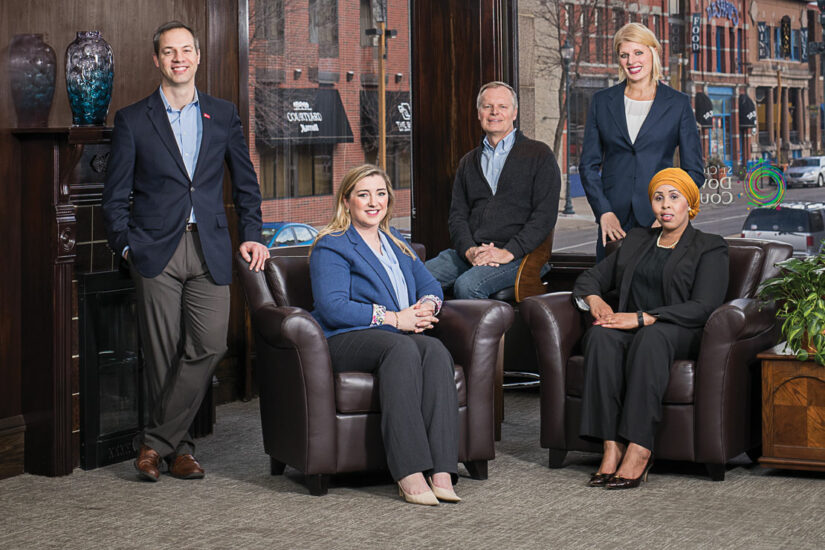
Rewarding Initiative
A new mentor-driven fellowship program powers up the innovators and idea people poised to help Central Minnesota thrive.
By Laura Billings Coleman | Photography by John Linn
From his view in the front of the classroom over the last decade, University of Minnesota Extension Educator Rod Greder could see for himself the struggles that students with attention problems face when trying to stay focused on their work. He also saw an opportunity.
“I just naturally started to wonder whether there was a technological solution that could help,” said Greder, a family farmer with a Ph.D. in genetics as well as a background in corporate marketing and research. From his home in Pine City, Greder began to assemble a team of researchers, partners and experts who shared his vision for an eyeglass interface that could detect when a wearer is distracted, and draw a wandering mind back to the work at hand.
Since its launch in 2010, Awear Technologies has attracted plenty of notice, including funding from the National Science Foundation, a new U.S. patent, and a recent showing as a finalist for the prestigious MN Cup, a startup competition sponsored by the U of M’s Carlson School of Management. But taking a big idea and turning it into a sustainable business is not always a straight path. “The struggle for most entrepreneurs is that they also have a life,” said Greder. “They’ve got obligations, and they’ve got bills to pay. You have to balance employment at your real job and working on your idea and your passion, and that can take time.”
But Greder’s bold vision for bringing assistive eyewear into education just got a big boost thanks to the Initiators Fellowship, a program of the Initiative Foundation that supports the region’s most promising social enterprise builders. Over the next two years, Greder will receive a $60,000 stipend to help cover living expenses and allow him to focus on his work plan and develop his leadership skills. As one of the first cohort of four Initiator Fellows, he’ll also receive customized technical training and mentor support to help move his idea from prototype to production. Fellows were chosen through a selective panel process in the fall of 2016.
Made possible by an endowment fund launched by Granite Equity Partners, along with other regional supporters, the Initiators Fellowship program is modelled on a successful fellowship created by the New York-based Echoing Green Foundation. It represents a major investment in Central Minnesota’s human capital—one that supporters believe will pay great returns over time. “The program is the latest in a whole portfolio of strategies the Initiative Foundation supports to promote economic development in the region,” said Rick Bauerly, founder and managing partner/CEO of Granite Equity Partners and a member of the Initiative Foundation’s Board of Trustees. “We don’t expect to launch another Google through these fellowships and mentorships. That’s not how we will measure success. Instead, the goal is to retain and empower leaders, entrepreneurs, innovators and initiators to apply their passion and their purpose over decades from within this region with assistance from the Initiative Foundation and its partners.”
In fact, the Foundation believes the program’s impact will extend well beyond the business community. “The person is valued over the project,” said Jeff Wig, the Initiative Foundation’s vice president for economic and organizational development, who also serves as program manager for the Initiators Fellowship. “Our aim is to develop key future leaders of Central Minnesota—people who will serve on our city councils and county commissions and lead our region’s nonprofit boards. We hope to see some Initiator Fellowship graduates on our own Board of Trustees some day.”
Here’s a closer look at the first four Initiators Fellows chosen for their commitment to powering what’s possible in Central Minnesota:
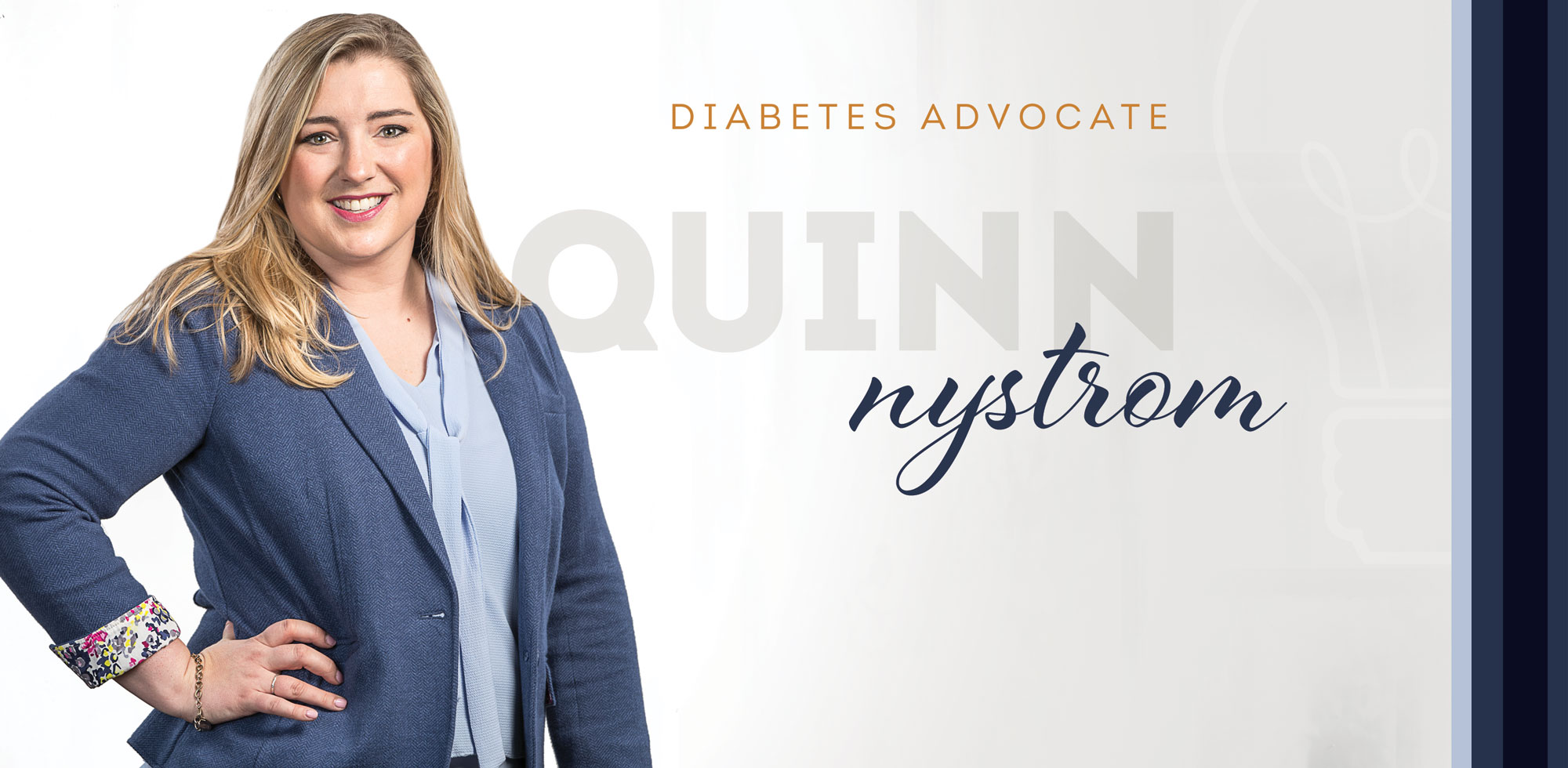
When Quinn Nystrom’s younger brother was diagnosed with Type 1 diabetes, the enterprising fifth-grade figure skater went straight to her school library to find out how to help. “Unfortunately there were just three books—one was a cookbook, and the other two were medical texts,” Nystrom remembers. None contained the answers she was looking for when, just over two years later, she learned she had the same chronic and incurable disease. “I was 13 and I really thought my life was over.”
Growing up in Baxter, Minn., Nystrom never met another teenage girl with diabetes until her parents sent her to Camp Needlepoint, a summer camp in Hudson, Wis., that’s hosted by the American Diabetes Association. Spending time with other teens who also were learning how to cope with constant carb counting, insulin injections and blood sugar checks was life-changing. “I realized that even though I didn’t get a choice about having a chronic disease, I did have a choice about determining the quality of my own life and how I was going to react.”
By the time she was 16, Nystrom set out on a national barnstorming tour as the American Diabetes Association’s National Youth Advocate, raising more than $150,000 for diabetes research, and becoming the youngest recipient of the prestigious American Diabetes Association Star Award. Now 31, Nystrom has written the book she wished for when she was first diagnosed: “If I Kiss You, Will I Get Diabetes?” (RiverPlace Press, 2014) and is building a national constituency as a patient advocate speaking for the one in 10 Americans with diabetes.
She’s also building a consultant business as a diabetes advocate for the more than 1.9 million Americans newly diagnosed with Type 1 diabetes every year. “I talk about what it’s really like, and that living with a chronic illness has taught me a lot about failure, and that I don’t get to win every day,” she said. “It also teaches you how to pick yourself up and dust yourself off and do what you have to do all over again.”
Nystrom, who will graduate with a master’s degree in communication management from Syracuse University this spring, said that lesson has been invaluable in all her pursuits, from winning a seat on the Baxter City Council to losing her recent run to represent District 10A at the Minnesota Legislature. She intends to use the Initiators Fellowship opportunity to build a sustainable business model from her home base in Central Minnesota. The business venture will allow Nystrom to respond to speaking requests from across North America, and to grow Dateline Diabetes, a nonprofit she launched to ease the financial burden for families with diabetes who face annual medical costs more than twice as high as non-diabetics.
“If I were living in Minneapolis, I don’t think I would have been given this opportunity, and I know it will allow me to reach more people right here in Greater Minnesota,” she said. With nearly 18,000 new cases of Type 1 and Type 2 diabetes diagnosed in the state each year, “Getting out there and telling people that life goes on after this diagnosis really means everything to me.”
Quinn is being mentored by Tom Anderson, chief executive officer of Integrated Retirement, a Brainerd-based provider of retirement plan expertise and services to financial organizations. Anderson is a friend of the Initiative Foundation and a member of its business finance committee.
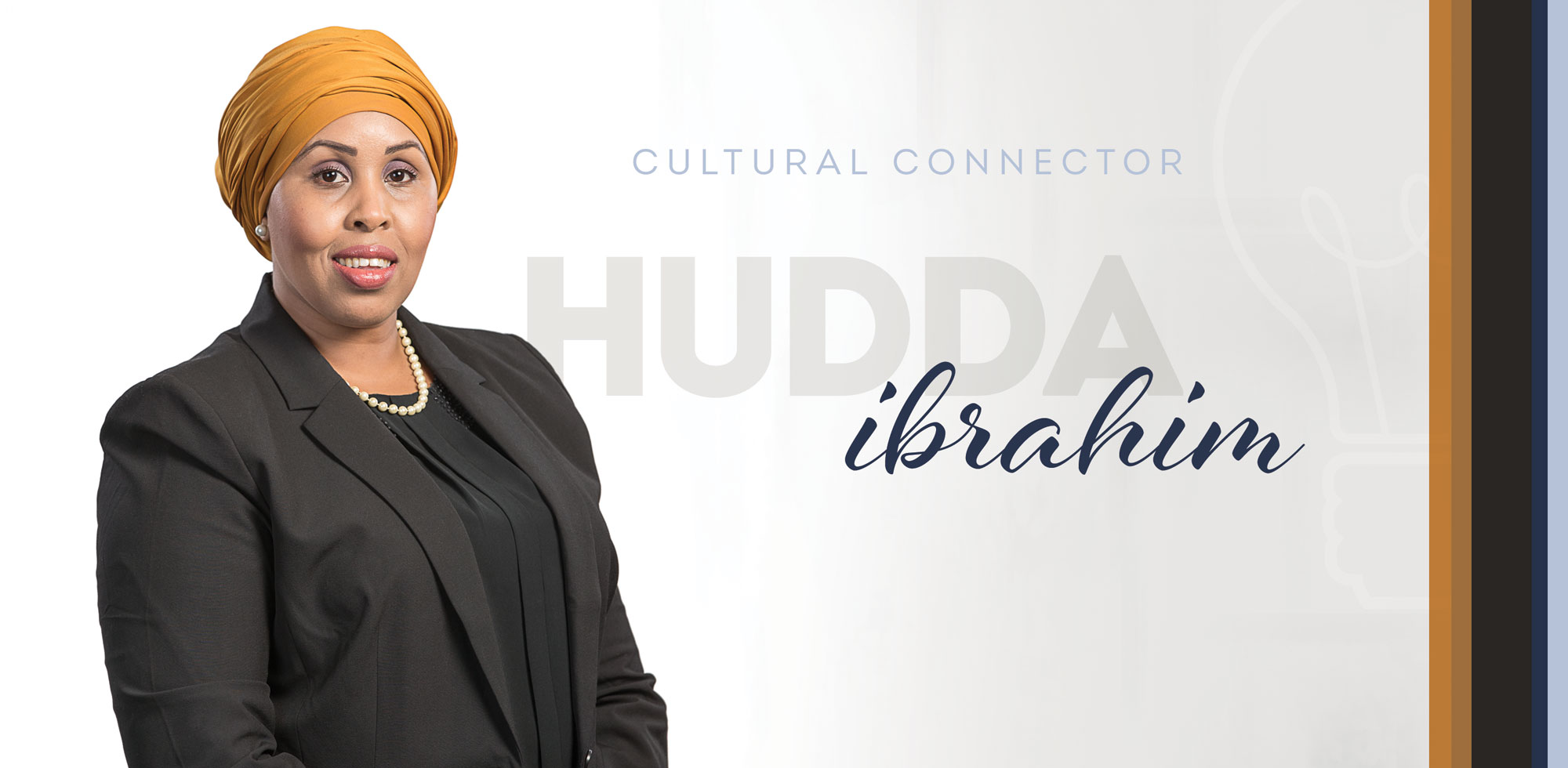
When she makes a new acquaintance, Hudda Ibrahim isn’t shy about asking for ideas to help connect Central Minnesota’s growing immigrant community with job opportunities. “There are so many hardworking people here, and we want to stay in the community that educated us,” said Ibrahim, a Somali-born peace and social justice educator at St. Cloud Technical & Community College.
Arriving on campus as a student in 2007, Ibrahim was at a loss about what to study and how to speak up—challenges she carried with her when she transferred to the College of Saint Benedict and found she was part of an even smaller minority of students of color.
“Being the only black Muslim woman in my class could be intimidating, but I started to understand that if I don’t extend my hand, I won’t make any progress,” she said. “It taught me to get out of my comfort zone and reach out into the community.”
That attitude clearly worked. Ibrahim was elected president of her class—the first Somali woman to hold the position. With a master’s degree in peace studies/policy analysis from the University of Notre Dame, Ibrahim interned for a Washington, D.C.-based nonprofit aimed at promoting dialogue between Palestinian and Jewish women, and even traveled back to Mogadishu to explore non-violent solutions to the conflict in Somalia. But coming back to St. Cloud—where she now mentors college-bound Somali girls—was always part of her master plan. “This is home,” she said.
Now with the support of the Initiators Fellowship, Ibrahim is working to launch a consulting firm committed to lowering the cultural barriers that exist between traditional area employers and an increasingly diverse community of newcomers ready for new opportunities in the workplace.
Ibrahim sees herself as mediator, career coach and liaison with the cultural fluency to help St. Cloud employers understand the special needs Muslim workers may have, for instance, and to train new immigrants about how to overcome cultural hurdles that can stand in the way of getting hired. She also hopes to help small immigrant and non-immigrant businesses see the benefit of reaching out to serve customers from across the community.
“The message I want to get out is that if you want to expand your business, you have to make room for other people.”
Hudda is being mentored by Joanne Kudrna, director of strategy services for Granite Equity Partners, a St. Cloud-based private investment and holding company and one of the primary investors in the Initiators Fellowship program. Joanne is a friend of the Initiative Foundation who shares her strategic planning expertise with local nonprofit organizations.
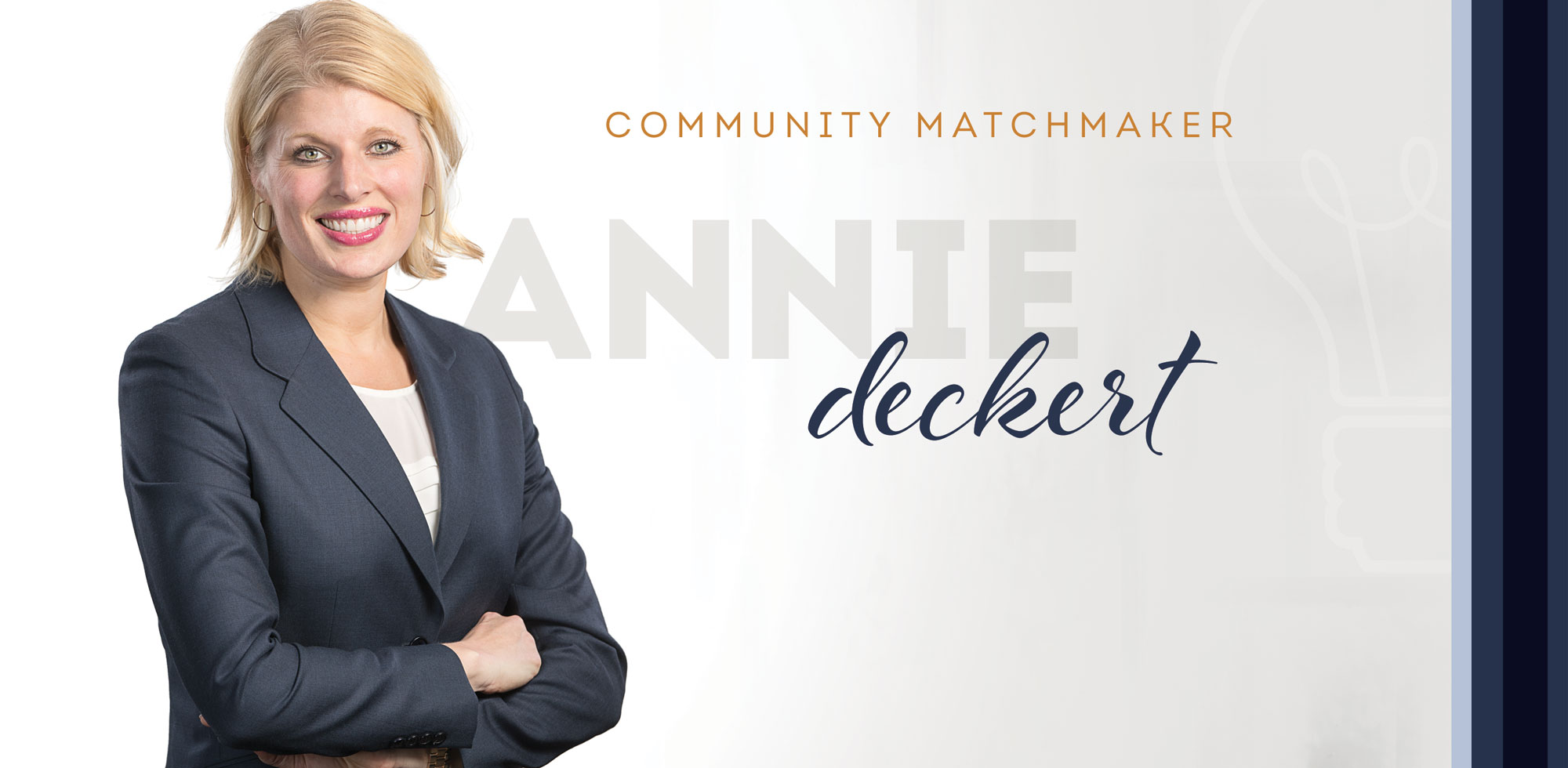
Fergus Falls native Annie Deckert has always loved the look and feel of a thriving main street, but it wasn’t until she took a class in urban planning at St. Cloud State University that she saw how policy and design can build connections in a community—or keep them from occurring. “I took a class that discussed the evolution of home design and its impact on neighborhood engagement,” said Deckert. “It was so interesting to me, I decided to make it my major.”
After graduating, Deckert turned a college internship into a city planning job in Big Lake, just as it became one of the country’s fastest growing communities. Later, as director of economic development in Elk River, she found she looked forward to meeting with small business owners and entrepreneurs, but could see they were often overwhelmed by the policy and paperwork involved in expanding their operations. “At some point you’d have to give them a huge stack of papers,” detailing everything from tax codes to zoning ordinances to tax incentive programs, “and say, ‘Good luck’—and then a lot of times, you’d never hear from them again, resulting in missed development opportunities.”
That discovery inspired her to start the Decklan Group, a consulting firm she launched with business partner Tim Dolan. The firm helps businesses navigate available financing opportunities and growth incentives, as well as assisting with branding strategies aimed at helping communities attract new business. “We sort of work as matchmakers between business and government, helping them find the right fit,” she said. Though the Decklan Group works primarily with manufacturing firms and mid-sized businesses ready to grow, Deckert said that small businesses, start-ups and social entrepreneurs could benefit from the assistance even more.
That’s why Deckert plans to use her Initiators Fellowship to serve that constituency—creating a new funding model that will serve businesses just getting off the ground, or even opening a collaborative co-working space where entrepreneurs can get good advice, share ideas and expand their networks. While she said many of Central Minnesota’s small towns have the business resources and workforce to attract new ventures, “The open-arm, how-can-we-help-you feeling is so great in Central Minnesota—sometimes you can solve a potential problem with a text message because people actually know each other on a first-name basis and strive to make things happen,” she said. “Coming from a small town, I hate seeing storefront or downtown vacancies—I just want to fill them all up. I want to do everything in my power to make things happen.”
Annie is being mentored by Elk River attorney David Monroy, a member of the Initiative Foundation’s Board of Trustees. David is past chairman of the Three Rivers Community Foundation, a Partner Fund of the Initiative Foundation, and chairs the Elk River Chamber of Commerce Board of Directors.
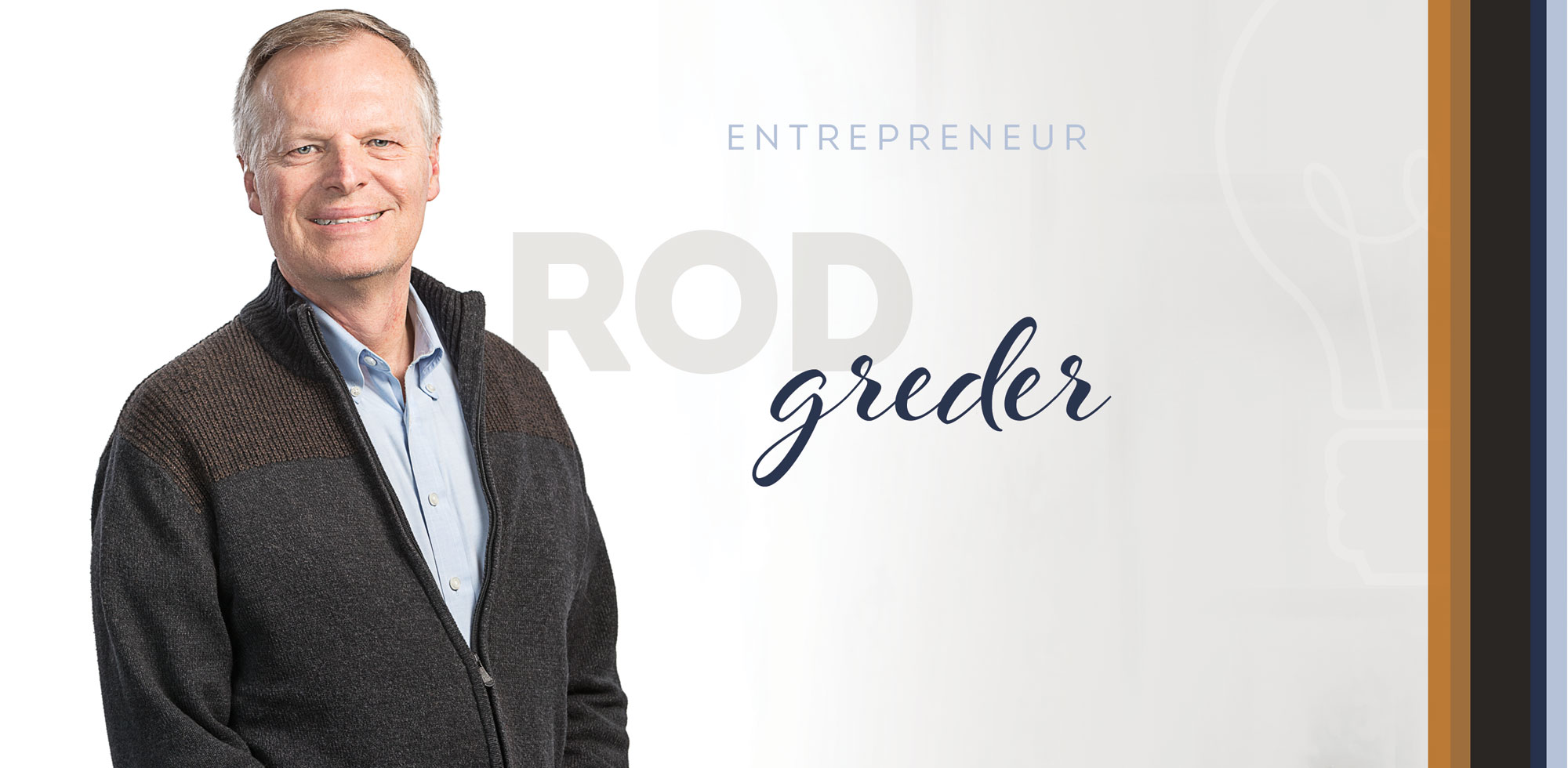
As CEO and founder of Awear Technologies, Rod Greder already knows his target market—the 10 million children who have attention difficulties that affect their learning. His next step is seeing how his assistive eyewear solutions work for students and educators—feedback that will help him fine-tune a finished product he hopes to bring to market by 2018. “The connections and the credibility that we have now through the fellowship with the Initiative Foundation are really going to help us to make those entry points into schools and learning centers,” he said. “It’s already opening new doors for us.”
Using a set of glasses with variable transparency, and software that detects electrical activity in the brain, Awear’s prototype can monitor a student’s mental focus. The lens stays transparent when students are engaged but clouds when the software detects mental drift, effectively building a neural pathway that encourages kids to refocus. “We’re trying to develop something new and novel,” said Greder. “There’s not a direct analog that exists right now, so one of our biggest challenges has been getting people to understand the science behind it. Our work is based on electroencephalography, neuroscience and feedback behaviors, and that’s not technical know-how that most people have.”
He believes that building the evidence for Awear’s effectiveness during his Initiators Fellowship will strengthen his start-up’s success rate, and could even improve outcomes for the nearly three million kids with diagnosed learning disabilities. “I am driven by the idea that we can make a difference,” he said. “That’s why I’m a teacher—to make a difference in the lives of young people, and this is another way to help fulfill that mission.”
Rod is being mentored by Traci Tapani, co-president of Stacy-based Wyoming Machine. Traci is a long-time member of the Initiative Foundation Board of Trustees and is active in youth and workforce development issues on a state and national level.